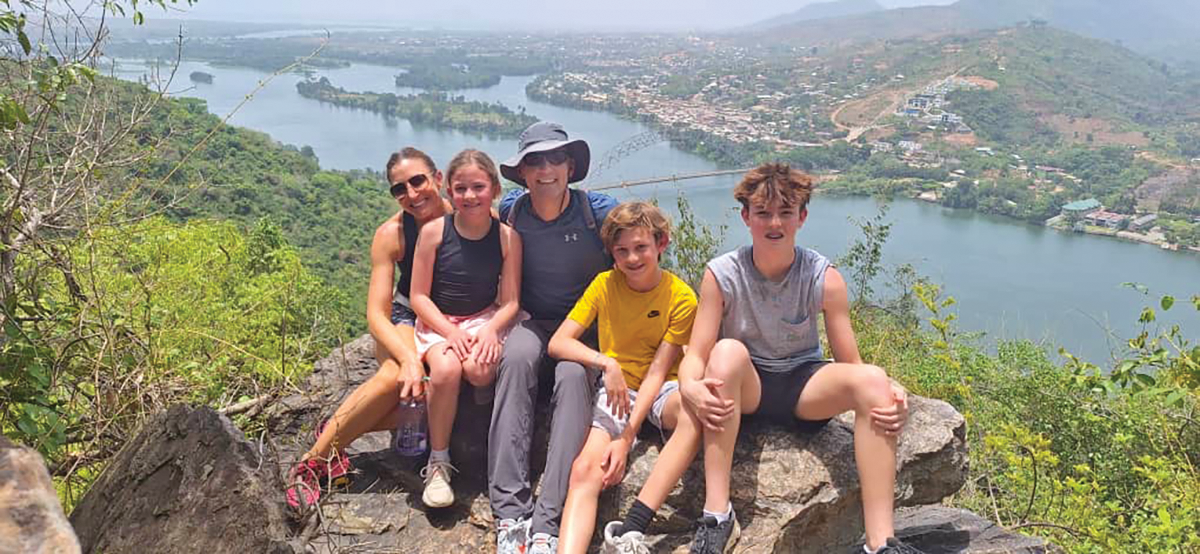After a formative global study course his senior year, Donald Wickline ’02 returned to Ghana with his family in the spring with the help of Elon connections.
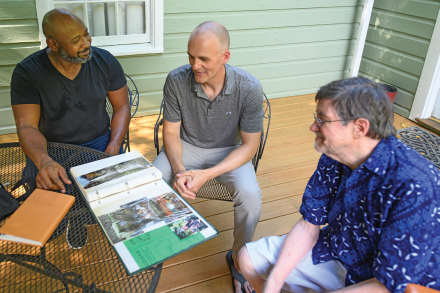
Ghana had been on Donald “Donnie” Wickline’s mind for more than 20 years. In January 2002, as a senior on his way to a history degree and medical career, he traveled to the West African nation in a course led by now Professor Emeritus of History Brian Digre. One last time before graduating that spring, Wickline wanted to broaden his thinking and push beyond his comfort zone.
What he gained was even more than he expected, providing lifelong global perspectives and forging a cultural awareness he continues to draw upon in his practice as a physician in central North Carolina’s Cone Health System emergency department.
“You grow a lot when you put yourself in places and situations you’ve not been before,” Wickline says. “Traveling to Ghana added to my toolbox in my future career in emergency medicine. I work with people and see patients from different cultures, backgrounds and experiences. The connections I made in that course help me better relate to patients I care for on a human level.”
He spoke of Ghana often to family and friends, recounting the friendliness and generosity of the Ghanaian people and the lessons he learned there. More than anything, he wanted his wife, Nikki Cervelloni Wickline — a 2002 alumna of the Dr. Jo Watts Williams School of Education — and their children to experience Ghana’s culture, values and the same shift in perspectives that he did.
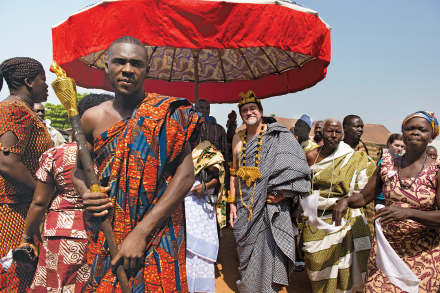
In summer 2023, the Wicklines decided the time was right. They put March 2024 on their calendar and began planning. They could have booked the trip through a travel agency but knew it wouldn’t provide the rich personal connections Donnie Wickline wanted them to share. After some urging, he emailed Digre, uncertain that the retired professor would remember him or want to help.
“He responded, ‘Of course I remember you, here’s my phone number, and I’m going to help you plan the whole thing.’ He leveraged his wealth of knowledge of Ghana and all his contacts,” Wickline says.
Digre offered suggestions for meaningful destinations, travel tips, guidance around cultural customs and general dos and don’ts for navigating the country on the ground. He even provided the names of doctors and medical centers, as well as contacts within the government, should the family need them. Knowing they would require a driver and general guide, he connected them to Assistant Professor of History Waseem Kasim — a native Ghanaian and a current coordinator of Elon’s Winter Term course GBL 2470 Ghana: West African History and Culture with Associate Professor of Anthropology Mussa Idris. Kasim led them to Patrick Umeh, partnerships development manager at Ensign Global College in Kpong, Ghana, which arranges Elon’s winter travel in the country.
“Elon is the kind of school where it’s not unheard of for students to reconnect with their professors after 20 years,” Wickline says. “I could have easily hired a company, and we would have had a good time, but this was a trip that was so much more meaningful because of Dr. Digre, Dr. Kasim and our connections with Elon.”
From history professor to chief
Digre’s connections to Ghana and Africa are deep and enduring. His experiences there began in 1978, when he served with the Peace Corps as a teacher in the Democratic Republic of the Congo. Digre became a professor at Elon in 1990, and in 1994 spearheaded a Department of Education grant to develop African studies within a new international and global studies major.
He led Elon’s first Winter Term course in Ghana in 1997. He taught the course for 21 years to more than 500 students before his retirement in 2019. The course Digre designed was rich in cultural and historical learning. Students visited significant sites such as the Cape Coast Castle and hubs of the transatlantic slave trade, and explored cultural landmarks and national parks. He enlisted Ghanaian professors and leaders to provide guest lectures, offering students understanding of contemporary life in West Africa.
Donnie had always talked about it and wanted to take us, but I didn’t quite understand it until we got there. It’s the people that make it such a special place. They live and breathe their values: living with what they need and putting everything else they have back into taking care of each other and their community. — Nikki Wickline ’02
An especially rich experience of the course was the interaction in Sokode, a rural community in the Volta region near the Ghana-Togo border. Students experienced Ghanaian hospitality, participating in family visits, school interactions and church services. Over the years, Elon contributed to various development projects, including funding for school construction and providing educational materials and scholarships for local students.
“Ghanaians are wonderfully friendly and welcoming people,” Digre says. “Some of our students had never traveled outside the U.S. and interacting with villagers in Sokode was an opportunity for them to see life in a traditional Ghanaian community. In conversations with Ghanaians, they learned about the aspirations of the Ghanaian people and found shared hopes and desires in life.”
In 2004, Digre was named an honorary chief of Sokode and given the title Togbe Dake in recognition of his years of support and service to the community and its schools. “Teaching the class all those years, I think its success is not just because of me and my planning, but the partners I had in Ghana, the colleagues who taught the class with me and the students.”
One of those students, of course, was Donnie Wickline. Digre remembers him as an engaged student and was intrigued by the history major’s planned path into medicine. On that 2002 trip, Digre put him in touch with physicians at local medical centers. Wickline went on to earn his medical degree from Marshall University School of Medicine in 2006.
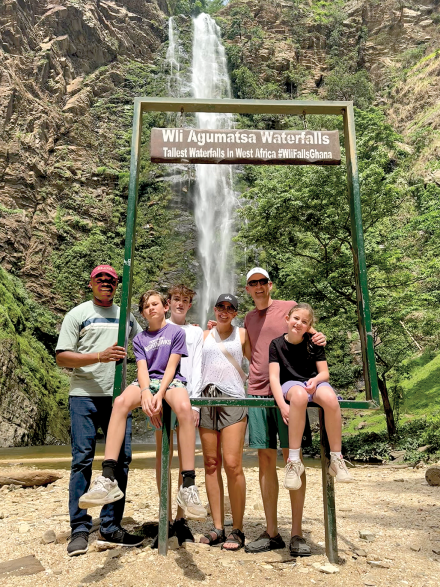
‘A life-changing experience’
Through Digre’s and Kasim’s guidance, the Wicklines were able to condense the three-week course and national tour into eight days. They visited the Tafi Atome Monkey Sanctuary; took in the splendor of Wli Falls, West Africa’s largest waterfall; toured museums and historic sites; and included a sobering visit to Elmina Castle on the Cape Coast, one of several UNESCO World Heritage Sites in the transatlantic slave trade. But the highlight was the two-day visit to Sokode.
They met with the chief and his family. Villagers welcomed them in, prepared and taught them how to cook traditional meals, and shared about their daily lives. They visited schools, meeting teachers and interacting with students there. “It didn’t matter where we were from or who we were: ‘You all are welcome here. You’re part of the village now.’ We’ll never forget how special it was,” Donnie Wickline says.
Connecting with Umeh as their driver and guide was also transformational. Umeh explained customs to the family, offered a safe and friendly ear for questions and conversed with the Wicklines about their life in America. They met his family and have stayed in regular contact since they returned to North Carolina.
“He picked us up and essentially was our family for the week,” Donnie Wickline says. “He was our friend and guide and took us everywhere. This trip wouldn’t have been as meaningful without his guidance and knowledge.”
“Patrick has become part of our family,” Nikki Wickline echoes.
Early in planning the trip, Digre recommended they bring soccer balls to give to villagers. “You’ll never go wrong bringing soccer balls as a sign of goodwill,” Digre told them. They also brought some American footballs to give away. Ghanaians love soccer, and the sport builds community across disparate sects of Ghanaian society, Kasim says.
“Watching Ghanaians play soccer together, you’d never believe they were from different religions or cultures,” he adds. “We bond a lot through games and through food.”
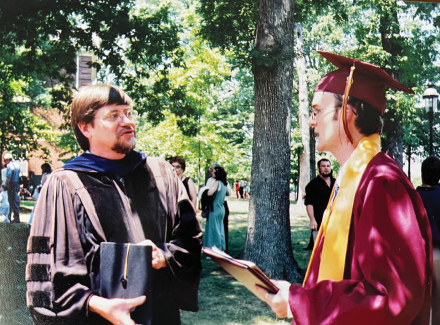
The Wicklines’ children — 14, 13 and 9 years old at the time of the trip — learned and taught games with children in Sokode. To their surprise, Ghanaian children were most interested in the relatively unfamiliar game of American football. Those interactions opened opportunities for conversations and insights about the similarities and differences between life in Africa and the U.S.
They left with a sense of the values and traditions of the Ghanaian people.
“It was a life-changing experience,” Nikki Wickline says. “Donnie had always talked about it and wanted to take us, but I didn’t quite understand it until we got there. It’s the people that make it such a special place. They live and breathe their values: living with what they need and putting everything else they have back into taking care of each other and their community. It was impactful to our children.”
Donnie Wickline is grateful for the gifts of revisiting the country and people who opened his eyes to new cultures and different ways of living, and being able to reconnect with his alma mater and past professor to provide those perspective-
shifting experiences for his children.
“The historical parts of the trip in 2002 and this spring were great, but the big reason I wanted to go back was because of how amazing the people are there,” he says. “I wanted my family to experience that, and because of Brian and Waseem and Patrick, they did.”



